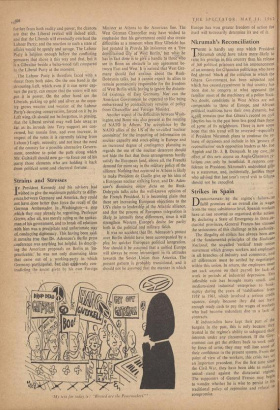Strains and Stresses
:President Kennedy and his advisers had ,Iwished to give the maximum publicity to differ- ,pnces,between Germany and America, they could . pot.have done better than force the recall of the ,German, Ambassador in y Washington—a. step „which they may already he regretting. ProfessOr .Grewe, after all,, was merely. acting as the spokes- man ,of his government, and to, break off relations „with him was a precipitate, and unfortunate way 0f.conducting diplomacy.! This having been ,said, it remains true that Dr..Adenauer's Berlin press ,conference was anything but helpful. In describ- ing the American proposals on Berlin as `im- practicable,' he was not only dismissing ideas that came out of, a working-party in which Germany:participated, eta; al4ol atatrently con- tradicting the assent given by his own Foreign Minister at. Athens to the American line. The West German Chancellor may have wished to emphasise that his gOVernment could also create difficulties at a moment when Herr.Ulbricht has just ipstated in Pravda Ills insistence on a `free dermiltarised 'C'ity" of Wet Berlin; but what he has in 'fact done is to give a handle to thoVho see in Bonn an obstacle to any agreement be- tween East and West. It is natural that West Ger- many, should feel anxious abOut the Rusk- Dobrynin talks, ,but it cannot expeCt its allies to remain permanentIY responsible for the freedom of West Berlin while having to ignore the distaste- ful existenCe of Eatt dermany. Nor can the American Gdvernment be expected to like being embarrassed by contradictory versions of policy from' Chance116r and Foreign Minister. Another aspect of ihedifilenities befWeen Wash- ington and Bonri was alSo Present at the meeting of NATO in Athens. The acceptance by the NATO allies of the US' of the so-called 'nuclear committee' for the imparting of information on nuclear capacity and stock-piling in Europe and an increased degree of contingency planning as regards the use of the nuclear deterrent should not hide the fact that.theSe arrangements hardly satisfy the European (and, above all, the French) demand for.more say in the military policy of the alliance. Nothing that occurred in Athens is likely to make President de Gaulle give, up his idea of a European nuclear sitIking force, and Dr. Aden- . auer's dismissive O biter dicta on the Rusk- • , • Dobry.nin talks echo the well-known opinion of the French President.'It',is beComing plain that there are increasing European objections to the US's claim to leadership Of. the Atlantic alliance, and that the process of European , integration is likely , to intensify' these.differences, since it will strengthen Western Eurolie's desire for parity both in the political and military fields.
It was no accident that Dr. Adenaiier's protest over Berlin should have been accompanied by a plea for quicker European political integration. Nor should it'beassured that a unified Europe will always be more intransigent in its attitudes towards the Soviet Union than America. The present pattern is probably transitional, and it , should not be assumed that the manner in which • ,,„y teAl 1(11 it Phil' is; -111('N■eil tin' I he Path Europe has won greater freedom of action for itself will necessarily determine its use of it.


































 Previous page
Previous page